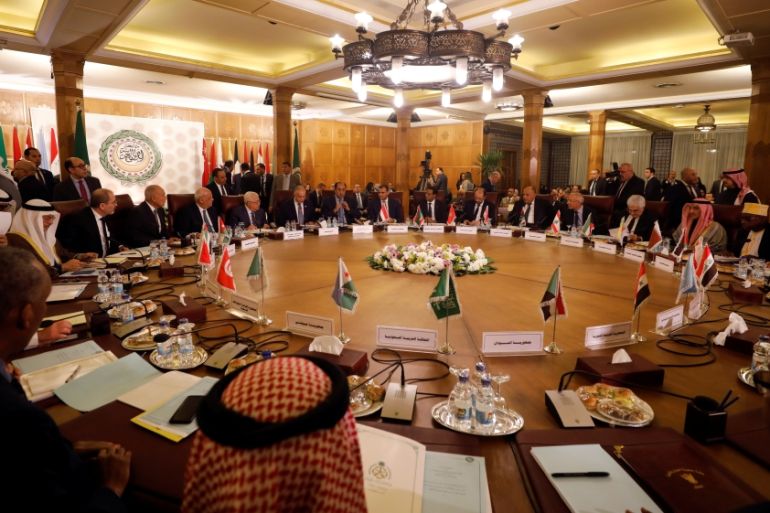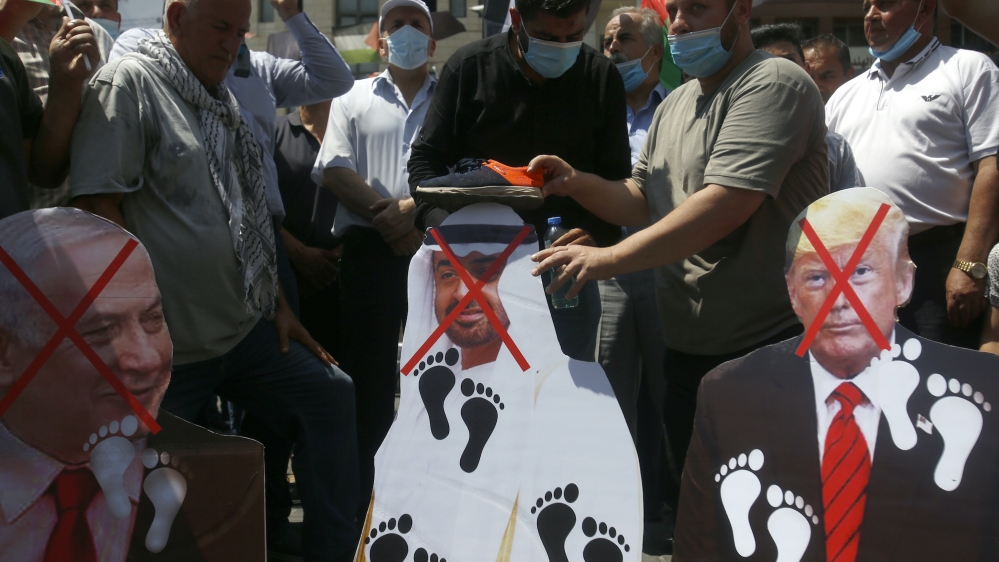Arab League division over Palestinian cause to dominate talks
Arab foreign ministers will attend a virtual session against the backdrop of UAE normalising relations with Israel.

An Arab League meeting on Wednesday will focus on the Palestinian cause after the Israel-UAE “normalisation” deal, with analysts suggesting division rather than usual unity on the issue will dominate the discussion.
The run-up to the virtual session has already left a sour taste for the Palestinian leadership.
Keep reading
list of 4 itemsIraq’s dangerous balancing act between Iran and the US
Russia-Ukraine war: List of key events, day 783
UN’s Libya envoy resigns citing no hope for political progress
On Sunday, the Palestinian Authority (PA) accused the United Arab Emirates (UAE) and Bahrain of blocking a draft resolution that called on Arab states to adhere to the 2002 Arab Peace Initiative plan before normalising ties with Israel.
The Arab Initiative put forth by Saudi Arabia calls for establishing ties with Israel in exchange for its withdrawal to the 1967 borders, a just solution for Palestinian refugees, and occupied East Jerusalem as the capital of a future Palestinian state.
A senior member of the PA’s governing Fatah faction, Hussein Hamayel, said Bahrain’s opposition to the draft resolution “places it on the side of the enemies of the Arabs and Muslims”.
However on Tuesday, in a bid to soften its tone, the official spokesman for PA President Mahmoud Abbas said the leader “will not accept insulting the national symbols of Arab nations, including the United Arab Emirates”.
|
|
In a statement carried by the official news agency Wafa, Nabil Abu Rudeinah said the state of Palestine is keen on “maintaining brotherly relations with all Arab countries on the basis of mutual respect, with the necessity of the latter adhering to the Arab Peace Initiative”.
‘Betraying the cause’
Announced by US President Donald Trump on August 13, the UAE-Israeli normalisation agreement caught the PA by surprise, which then accused the UAE of betraying the Palestinian cause – long seen as a pan-Arab issue.
Israeli Prime Minister Benjamin Netanyahu said more Arab countries will soon follow in the UAE’s steps, and Bahrain and Oman have both voiced support.
“The Palestinian cause has traditionally been a unifying theme for the Arab League, which this year appears to be more a cause for division, rendering the Arab League ever more irrelevant in managing the affairs of the Arab world,” said Andreas Krieg, assistant professor of security studies at King’s College London.
The motion to be put forth by the Palestinian leadership will likely not be endorsed by a number of Gulf states, he added.
“While there might not be an immediate move by any other Arab state to normalise ties with Israel formally, there will be more exchanges and engagement with Israel, which is no longer tied to the Palestinian cause,” Kreig told Al Jazeera.
“For the UAE, Bahrain and Sudan, the Arab-Israeli conflict has been relegated to the Israeli-Palestinian problem, which should not be an obstacle to a warming of bilateral ties with Israel.”

Marwa Fatafta, a policy member with the Palestinian policy network Al-Shabaka, agreed, saying geopolitical interests “trump the rights of Palestinians”.
|
|
“Many Gulf states have keen interest in formalising ties with Israel and the UAE-Israel was the ice-breaker,” she said. “Normalisation between Israel and Gulf states has already been in the making, and now it is just a matter of timing.
“What would probably come out from the Arab League is the usual recycled lip-service to the Palestinians,” she added.
Saudi stance
The Arab League, in contrast to Abbas’s granted request to hold an emergency session in the aftermath of the US announcing Trump’s Middle East Peace Plan, refused to do the same once news of the UAE-Israel agreement was announced.
This led to Saeb Erekat, the secretary of the Palestine Liberation Organization (PLO)’s Executive Committee, to call on Arab League chief Ahmed Aboul-Gheit to condemn the UAE’s normalisation deal with Israel – or step down.
“If he is not able to issue a statement condemning the UAE-Israeli normalisation, he should resign,” Erekat told PalestineTV.
And while regional power Saudi Arabia has declared it will not normalise relations with Israel without securing Palestinian interests, Riyadh fell short of condemning the UAE’s decision.
“Saudi Arabia will verbally endorse the Palestinian cause, the issue of Jerusalem, and the Arab Peace Initiative,” Kreig said. “However, it remains to be seen what Riyadh does in terms of action on the matter.”

The oil-rich kingdom could choose the opportunity to shore up support for the Arab Peace Initiative, Kreig continued, while simultaneously not taking a solid stance against normalisation, thereby leaving the door open for individual Arab states to deal with Israel as they see fit.
“With the UAE as a leading Arab state already sacrificing the Palestinian cause to satisfy Emirati national interests with Israel, it will be hard to build firm support for the Arab Peace Initiative in this multilateral setting,” he said.
Fatafta said Saudi Arabia will stick to the Arab Peace Initiative plan, more for the sake of convenience, while at the same time cultivating warmer ties with Israel.
“Saudi Arabia indicated on number of occasions over the years that it has interest in cooperating with Israel especially with the growing threat from Iran,” she said.
“In fact, Saudi Arabia facilitated the normalisation deal between Israel and the UAE by opening its airspace for direct flights between the two countries.”